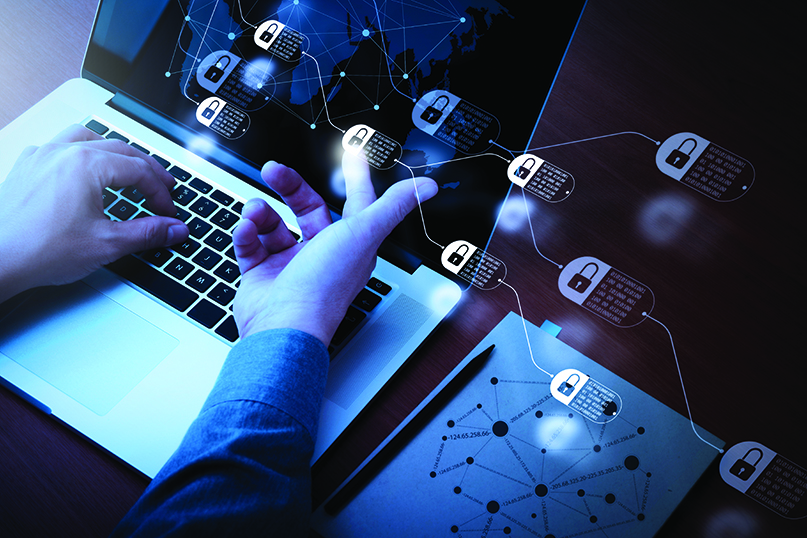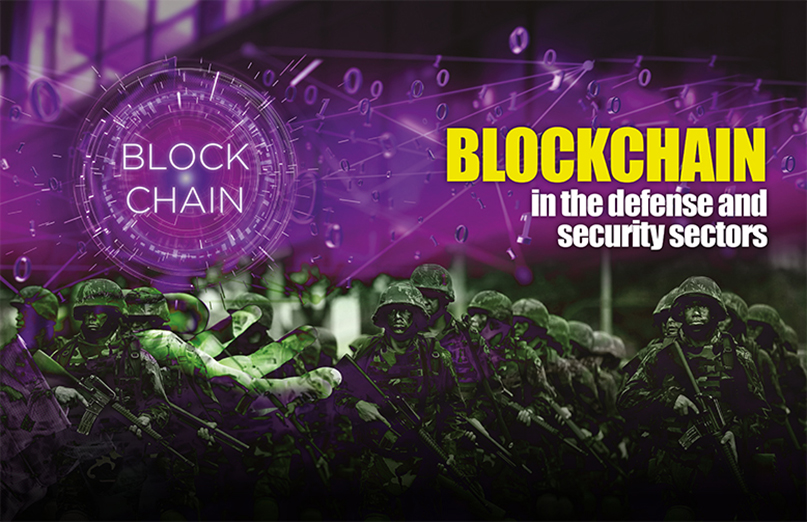Blockchain technology, can be defined as the technology of decentralized distributed records, or a mechanism aimed at providing a higher level of protection and security for data, through its many features, which include invulnerability, auditability, and encryption, while ensuring transparency among dealers who usually don’t know each other.
Although Blockchain technology was initially exclusive to Cryptocurrency and the financial sector, many other sectors have begun to rely on it to record data they don’t want to be changed or reversed, so that it can be used as smart contracts, by integrating it promptly with related transactions.
Among the most prominent sectors to have used Blockchain technologies are the industrial and healthcare sector, the pharmaceutical sector, the real estate sector and retail trade, the supply chain, the legal sector, and the publishing sector. It comes as no surprise that the defense and security sectors have adopted Blockchain technologies, as the military-industrial complex and security institutions have always been at the forefront of innovating technology and using it.
Given that the military-industrial complex’s share of spending on research and development in the defense and security budgets of the great world powers has always been large, it is only natural that with their priority funding, ground-breaking inventions are usually proliferated within the military sector and exploited there, before they reach civilian hands. The list of technologies that underwent the same process is actually long, including ARPANET which later became “the internet” as we know it, Wi-Fi, and GPS.

There are two types of blockchain: “open chains” (used in Cryptocurrency) and “private chains”, which are much more suitable for the military and security field.
Opportunities provided by blockchain technologies for the defense and security sectors
In the security sector, blockchain technology is commonly used in areas related to digital identity and passports, flagging and blocking fake passports, monitoring illegal attempts of escaping the country, and preventing fraud and vote tampering during elections.
In this context, the Australian government confirmed that Blockchain technology is used as an integral part of protecting Australian businesses and the country from cyber-attacks. Using Blockchain technology has allowed it to reduce the rate of cyber-security breaches, which had increased by 80% between mid-2019 and mid-2020.
This prompted the French National Gendarmerie to contract Tezos, a blockchain company that provides a service by the same name, to combat digital crime, especially in the field of secure smart contracts, as it has advantages compared to other technologies that are more vulnerable to devastating security breaches.
Mainly because the Tezos smart contract programming languages ensure the highest levels of security, including features like the ability to collect the confirmation of all parties involved in the transaction, before it can be confirmed and added to the block.
It also gives parties the ability to track and review the origin and date of the transaction, it also guarantees the immutability that makes it impossible to make any change in any transaction, after it is confirmed and added to the blockchain.
There is also the feature of unitary record, which enables users to obtain any information related to their transaction from a single database without the need to refer to several records, and finally, the ability to absorb future innovations without users even realizing it and without any interruption in the network’s function.
The PLA Daily reported in one of its editorials, that the Chinese military has used blockchain technology to improve operations within its institutions. Through these technologies, files can be created to store data belonging to military personnel, which includes basic information, future career prospects, and the training courses they must pass, making it easier and more logical to evaluate and promote these personnel based on their individual performance.
Given Blockchain technology’s ability to store and transmit information securely, and the military’s production and transmission of huge amounts of data, it makes sense that the military would rely on such technology.
The military’s reliance on information creates vulnerabilities that can be addressed by a technology such as Blockchain, due to its security that relies on distributed blocks of data instead of using a central server that is more vulnerable to cyber-attacks and its stability to maintain information integrity at all levels and protect highly confidential data.
On the other hand, the process of sharing information in the military is extremely complex and difficult, given the inherent complexity of such multifarious institutions.
In general, the process is built around several commanders, mainly the chiefs of staff of the army, air forces and navy, etc. In addition to the directors of other army departments, the department related to the state, and the political leadership.
Coordination between all of these parties is not an easy task, because each of these entities has its own unique prevailing internal culture, and operates according to a certain logic, which makes Blockchain technology the ideal solution for communication between military departments and maintaining the fluidity of information and protection from security breaches.
Lately, Blockchain technology has become one of the cornerstones of the security of communications and information systems (CIS) used in some militaries to ensure the confidentiality of information. This has resulted in new applications related to the defense sector, especially regarding information security, data authentication, integrity, and flexibility of access and use, particularly information related to operational plans, rules of engagement, supply plans, etc.
In 2015, the United States developed a secure blockchain messaging platform, through the Defense Advanced Research Projects Agency (DARPA), improving communication within the US Department of Defense and with its multiple organizations.
Messages encrypted with these techniques are completely unidentifiable via their metadata, it also boasts high confidentiality standards, and it’s impossible for a third party to identify the sender and recipient.
Several studies indicated the development of many Blockchain programs in armies belonging to Russia, Israel, and NATO countries.

Blockchain technology concept with diagram of chain and encrypted blocks. Double exposure of businessman hand working with new modern computer and business strategy and social media diagram.
Given the features of these technologies, especially the impossibility of changing data without the knowledge of all affected parties, the ability to track all transactions, and the inability to control operations from one party to the supply chain without the other. French defense experts confirmed in a recent survey conducted by Accenture, that blockchain technology could potentially drive growth and efficiency in all military branches, especially those responsible for supply chains and armaments, which include multiple parties.
Supply chains developed by blockchains allow for coordination of the interaction of external and internal participants in supply chains and armaments of the military in real-time.
Blockchain technology provides a secure, verifiable, traceable, shareable record and a way to see every part of the supply chain and armaments; in real-time, making sure each party can identify and address problems as soon as they arise before they escalate.
Therefore, many experts think that the Blockchain technology has the ability to change the shape of military industrialization significantly, through decentralizing military production while maintaining the integrity and confidentiality of data, because it allows for monitoring of the workforce during operation, in addition to real-time monitoring of the entire operations of logistical supplies.
Blockchain technologies have begun playing a more prominent role in the security of digital information related to high-tech weapons, such as drones, cyber-attacks, etc, which are being used more frequently in new conflicts.
It also plays an important role in securing data associated with critical weapon systems, supporting nuclear weapons or satellites for example.
Does Blockchain technology pose a risk to the defense and security sectors?
For all its benefits, blockchain technology poses numerous risks to the defense and security sectors; some researchers point out that it doesn`t automatically equal protection from money theft, impersonation, or deception, pointing to incidents where a “nuclear power plant”, credit cards, smart cars, accounts of celebrities and companies such as Google, Microsoft, Facebook, and Twitter, have been hacked.
Though usually, the hackers exploit the employees of the targeted companies, using social engineering and monitoring to understand behavioral patterns of those employees, eventually using it to hack the company, which is what happened in the case of gaining access to the server rooms of a banking institution.
For its part, blockchain technologies began developing behavioral monitoring systems, to enhance cyber-security. These complex systems monitor the normal behavior of individuals in certain processes, store the data, and electronically use it to enhance cyber-security.
Another challenge the technology faces is the possibility of data tampering before it is stored into the blockchain, through hacking and manipulation, though these are very rare cases.
In one case, a group of hackers managed to steal millions of dollars from Bitmart, a cryptocurrency trading platform, by stealing the keys to two wallets connected to the Internet.
In an official statement, The platform’s official website has confirmed the hack, describing it as a “large-scale security breach”, saying the hackers withdrew assets estimated at about $150 million, while Peckshield, a cybersecurity, and blockchain firm, estimated that the amount stolen by the hackers is closer to $200 million. To avoid this issue, experts advise users to link the Blockchain technology with other technologies such as artificial intelligence, saying Artificial intelligence is the ally of the human element and is invaluable in the fight against cyber threats, performing processes ranging from follow-up, identification, monitoring, repelling, analysis and other defense and protection mechanisms, when dealing with cyber-attacks.
« By: Prof. Wael Saleh
(Principal researcher and Head of the Cognitive Trends Follow-up Unit at the TRENDS Research and Advisory)













